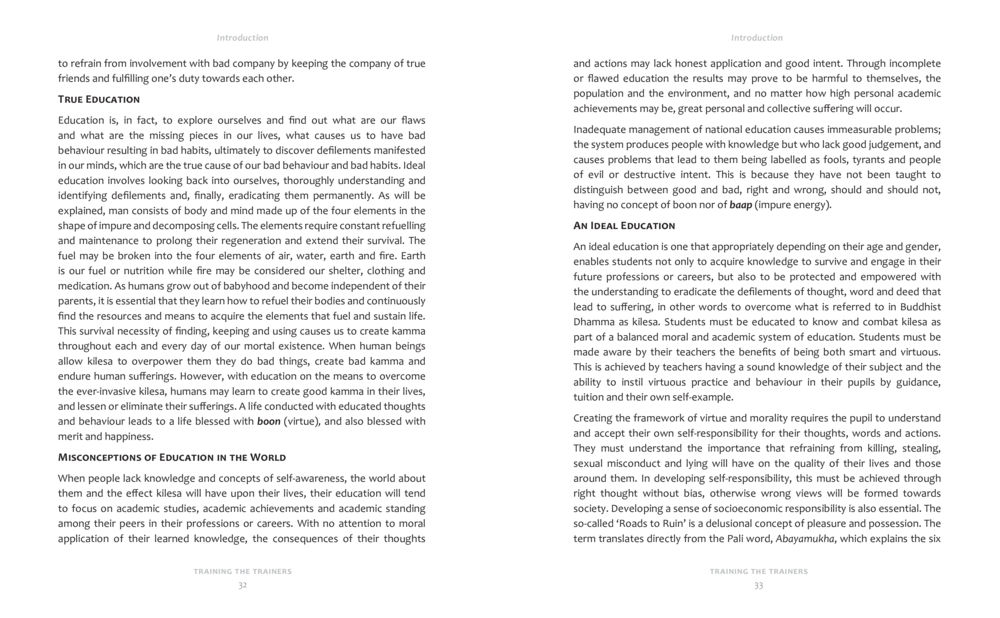Understanding True Education and the Role of Kilesa : หน้า 17/47
Training the trainer part 1 : หน้า 17/47 Explore the essence of true education as a means to eradicate defilements and improve moral judgment, emphasizing the importance of virtue in learning.
1 ครั้ง

สรุปเนื้อหา
การศึกษาที่แท้จริงคือการสำรวจตัวเองและเข้าใจข้อบกพร่องของเรา การศึกษาเพื่อแก้ไขการกระทำที่ไม่ดีและสร้างกรรมดีช่วยให้ลดทุกข์ในชีวิตได้ โดยมีการจัดการที่เหมาะสมเพื่อยกระดับศีลธรรมและความรับผิดชอบในสังคม การมีความรู้และความเข้าใจที่ถูกต้องเป็นสิ่งสำคัญสำหรับเยาวชนในการพัฒนาวิธีคิดที่ดีและการตัดสินใจที่ถูกต้องซึ่งจะนำไปสู่ชีวิตที่เกิดผลบุญและความสุข การขาดความรู้เกี่ยวกับการรู้จักตัวเองจะส่งผลกระทบต่อการศึกษาทางวิชาการและนำไปสู่อันตรายได้ ดังนั้นการศึกษาที่ดีควรมุ่งเน้นทั้งความรู้และการสร้างคุณธรรม.
หัวข้อประเด็น
- ความสำคัญของการศึกษา
- การเข้าใจธรรมชาติของจิตใจ
- ความรับผิดชอบส่วนบุคคลในกระบวนการเรียนรู้
- การสร้างคุณธรรมและความรู้คู่กัน
- วิกฤตการศึกษาของสังคมในปัจจุบัน
ข้อความต้นฉบับในหน้า
to refrain from involvement with bad company by keeping the company of true friends and fulfilling other's duty towards each other.
TRUE EDUCATION
Education is, in fact, to explore ourselves and find out what are our flaws and what are the missing pieces in our lives, what causes us to have bad behaviour resulting in bad habits, ultimately to discover defilements manifested in our minds, which are the true cause of our bad behaviour and bad habits. Ideal education involves looking back into ourselves, thoroughly understanding and identifying defilements and, finally, eradicating them permanently. As will be explained, man consists of body and mind made up of the four elements in the shape of impure and decomposing cells. The elements require constant refuelling and maintenance to prolong their regeneration and extend their survival. The fuel may be broken in four elements of air, water, earth and fire. Earth is our fuel or nutrition while fire may be considered our shelter, clothing and medication. As humans grow out of bodyhood and become independent of their parents, it is essential that they learn how to refuel their bodies and continuously find the resources and means to acquire the elements that fuel and sustain life. This survival necessity of finding, keeping and using causes us to create kamma throughout each and every day of our mortal existence. When human beings allow klesa to overpower them they do bad things, create bad kamma and endure human sufferings. However, with education on the means to overcome the ever-invasive klesa, humans may learn to create good kamma in their lives, and lessen or eliminate their sufferings. A life conducted with educated thoughts and behaviour leads to a life blessed with boon (virtue), and also blessed with merit and happiness.
MISCONCEPTIONS OF EDUCATION IN THE WORLD
When people lack knowledge and concepts of self-awareness, the world about them and the effect kilesa will have upon their lives, their education will tend to focus on academic studies, academic achievements and academic standing among their peers in their professions or careers. With no attention to moral application of their learned knowledge, the consequences of their thoughts
TRAINING THE TRAINERS 32
and actions may lack honest application and good intent. Through incomplete or flawed education the results may prove to be harmful to themselves, the population and the environment, and no matter how high personal academic achievements may be, great personal and collective suffering will occur. Inadequate management of national education causes immeasurable problems; the system produces people with knowledge but who lack good judgement, and causes problems that lead to their being labelled as fools, tyrants and people of evil or destructive intent. This is because they have not been taught to distinguish between good and bad, right and wrong, should and should not have no concept of boon nor of baap (impure energy).
AN IDEAL EDUCATION
An ideal education is one that appropriately depending on their age and gender, enables students not only to acquire knowledge to survive and engage in their future professions or careers, but also to be protected and empowered with the understanding to eradicate the defilements of thought, word and deed that lead to suffering, in other words to overcome what is referred to in Buddhist Dhamma as kilesa. Students must be educated to know and combat kilesa as part of a balanced moral and academic system of education. Students must be made aware by their teachers the benefits of being both smart and virtuous. This is achieved by teachers having a sound knowledge of their subject and the ability to instil virtuous practice and behaviour in their pupils by guidance, tuition and their own self-example.
Creating the framework of virtue and morality requires the pupil to understand and accept their own self-responsibility for their thoughts, words and actions. They must understand the importance that refraining from killing, stealing, sexual misconduct and lying will have on the quality of their lives and those around them. In developing self-responsibility, this must be achieved through right thought bias, otherwise wrong views will be formed towards society. Developing a sense of socio-economic responsibility is also essential. The so-called ‘Roads to Ruin’ is a delusional concept of pleasure and possession. The term translates directly from the Pali word, Abaymukha, which explains the six
หน้าหนังสือทั้งหมด
หนังสือที่เกี่ยวข้อง
Load More















































